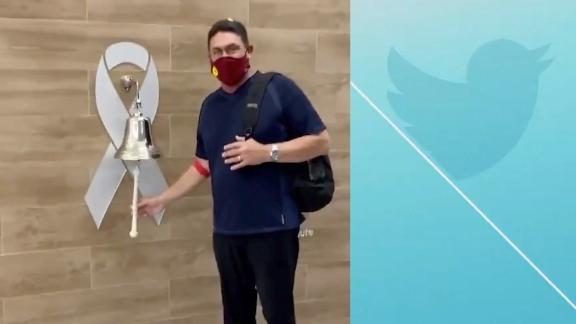In New Hampshire last fall, Ross McLeod, a local prosecutor in the town of Windham, didn't think there was much wrong with running his fantasy league from his office between court appearances. After all, he was playing with guys he knew for 20 years -- guys who worked at a Pizza Hut together as kids.
The trouble was that McLeod was also running for the job of town selectman, and that made him fair game.
Americans for Prosperity, a conservative political advocacy group, filed a public records request for his emails and found that the 51-year-old was sending information about trades and payouts to league members on office time. As fast as you can say "trade Tebow," the town of Windham had a scandal on its hands, and McLeod was forced to resign his job under fire.
The story might have ended there -- a cautionary tale for public officials in these partisan times during which McLeod was still able to win the election despite the claims. But on July 18, the fantasy football furor in Windham took an even more bizarre turn.
The state's attorney general went to court for a warrant to search McLeod's home and included in the application a nine-page affidavit revealing that the prosecutor encouraged his friends to stonewall investigators.
"I can't say too much while the AG's Office has an open investigation," he wrote on Feb. 28. "Suffice it to say that I greatly appreciate what all of you have emailed in response to this purely political exercise. … I don't know if anyone will try to contact you via your email addresses. If anyone does, please let me know ASAP and do not respond to them."
According to the affidavit, that warning might be enough for prosecutors to charge him with witness tampering.
If all of this sounds incredible -- a respected politician losing his job over a league in which the buy-in was 40 bucks and one member referred to his friends as "a bunch of buddies playing a game we love" -- that's the age of politics we live in. McLeod's attorney, Roger Chadwick, has called the investigation "local town politics at its worst," and said, "I am very much concerned with Ross' reputation. … It's a sham that this continues to go on."
But it's also a reminder that some people still consider fantasy football wagering a no-no at work.
In one of the most over-the-top incidents, four managers at a Fidelity office in Fort Worth, Texas, got the ax when they were accused of violating the company's policy on gambling. One of the fired workers, Eric Pettigrew, told reporters that it all started when a Fidelity manager found two IMs on his phone.
"One of my buddies sent me something about how bad Trent Edwards was playing or something like that," Pettigrew told The Fort Worth Star Telegram. "So they called me in and talked to me for about 90 minutes on everything I ever knew about fantasy football. They interrogated me like I was some sort of international gambling kingpin."
Just to be clear, the U.S. Criminal Code explicitly exempts fantasy sports in its legal definition of gambling. But using work computers to play ball is another matter, especially when the boss isn't playing along.
Perhaps some advice: Do your trades at Starbucks. That is, unless you're working there.
File Under:
Fantasy Fraud: Here at The File, we don't have $30,000 to spend on a car, let alone wagering on the Green Bay Packers defense. But there are plenty of high rollers who play in big-stake fantasy contests. The problem is the contests are virtually unregulated, as Cary Katz learned when he was recruited by The World Championship of Fantasy Football to play in a "platinum high roller league." The league's September 2010 draft was a lavish affair in Las Vegas with former NFL players and film crews, and the professional poker player put down $30,000 to play.
When Katz finished the season in second place and came knocking for his $95,000 in winnings, however, he learned that his money had been used to pay prior winners and nothing was left. In other words, the company with 100 leagues and 1,200 teams was one big pyramid scheme.
The Missouri Attorney General's Office is suing bankrupt parent company Gridiron Fantasy Sports on behalf of 32 others who say they never received promised prizes, ranging from a trip to Super Bowl XLV with $300,000 in spending money to $5,000 for the team with the most fantasy points.
"Fantasy football is great, but contests like these aren't regulated by any governmental agency," says Doug Ommen, chief counsel of the Missouri AG's office. "They're not hard to set up and easy to shut down."
He recommends simple precautions, like asking whether the contest's sponsor has enough in escrow account to cover payouts. He's also not optimistic that he'll be able to recover much money in this case. "At this point, we're more interested in making sure these people don't do business in Missouri again," he says.
It's all fun and games until someone gets hurt: Finally, we present this 2008 police report from Charlotte County (Fla.) as the ultimate cautionary tale for sore losers. It describes how a man named Chester Ward was so distraught about losing points in his fantasy league that he took a razor knife to a book his roommate was reading, sliced out its pages and then moved the knife up to the roommate's neck. Court records show that Ward was found guilty of aggravated assault with a deadly weapon and battery on a police officer. An absence of incidents since then suggests that he's either stopped playing fantasy football or started winning.
-- Shaun Assael




